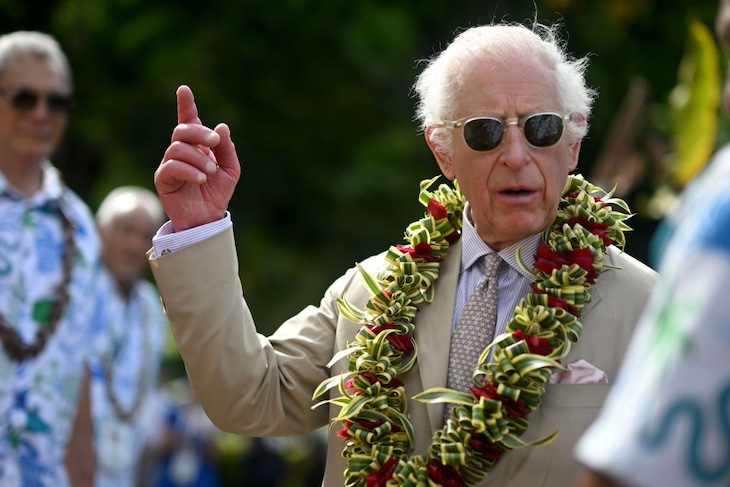
For his first formal address as head of the Commonwealth, King Charles would probably have preferred to veer away from controversy. Unfortunately, delivering an anodyne and people pleasing speech was not on the agenda.
Ever since it was announced that Samoa would be hosting a gathering of the 56 Commonwealth countries, it was inevitable that the hot-button issues of imperialism and western complicity in the slave trade would be high on the agenda, and the vexed issue of potential reparations has, inevitably, dominated proceedings so far.
The ‘creative ways’ he suggested Britain might offer apologies for its part in the slave trade may not be enough for many
During his 12-minute speech (which he later described to Keir Starmer as ‘very long’), the King had to tread a fine line between his natural inclination to soothe and unite, and not going against his government’s policy that reparations will not be paid for Britain’s part in the slave trade.
In the key passage of his address, he said ‘none of us can change the past. But we can commit, with all our hearts, to learning its lessons and to finding creative ways to right inequalities that endure. Nothing, it seems to me, would do so more decisively than to champion the principle that our Commonwealth is one of genuine opportunity for all.’
This is in keeping with his previous remarks about his country’s imperial past. The carefully measured tone that he has adopted – as with virtually every public statement he has made since becoming monarch – has been designed to be as compatible as possible with Starmer’s similar remarks. He talked of ways in which the ‘family of nations’ that the Commonwealth consists of might move forward with ‘respect, compassion and compromise’, but there were no hints about what this might consist of.
Still, anyone expecting the King suddenly to start putting forward detailed – and uncosted – examples of national policy would be deeply disappointed, as well as misunderstanding the role of the monarch. His job is to inspire, the prime minister’s is to disappoint and to annoy.
On its own terms, it was a powerful speech, delivered with the clarity and intelligence that has been a hallmark of all of Charles’s addresses over the past couple of years. He acknowledged his own personal history with the Commonwealth – at 75, it is exactly the same age as him. And he stated that he possesses, ‘an unshakeable faith in the special nature of our Commonwealth and the extraordinary value it holds. This is a family – or “aiga” as our Samoan hosts would say – of countries, of organisations and of people. All nations are equal in this unique and voluntary association.’
Once again, there was an echo of his mother’s famous speech, delivered on her 21st birthday, in which she pledged a lifelong devotion to the Commonwealth and its people for as long as she reigned. This, you feel, is the part of the monarchical inheritance that the King is instinctively most comfortable with, taking up the burden of ages and placing himself in the grand line of royalty.
Unfortunately, it is no longer enough for the monarch to stand above political concerns, and Charles’s remarks will be closely monitored – and discussed – by everyone from Downing Street to those countries demanding reparations for slavery.
Still, with William apparently resigned to the Commonwealth breaking up during his reign, there might have been an implicit rebuke in his father’s remarks that ‘our cohesion requires that we acknowledge where we have come from. I understand, from listening to people across the Commonwealth, how the most painful aspects of our past continue to resonate.’
The ‘creative ways’ that he suggested that Britain might offer apologies for its part in the slave trade may not be enough for many. But there is no doubt that the King, with his keen interest in history and tradition, has engaged in this issue, and he will, undoubtedly, have more to say about this most vexed topic in the future. The government can only hope that he continues to toe the party line.

